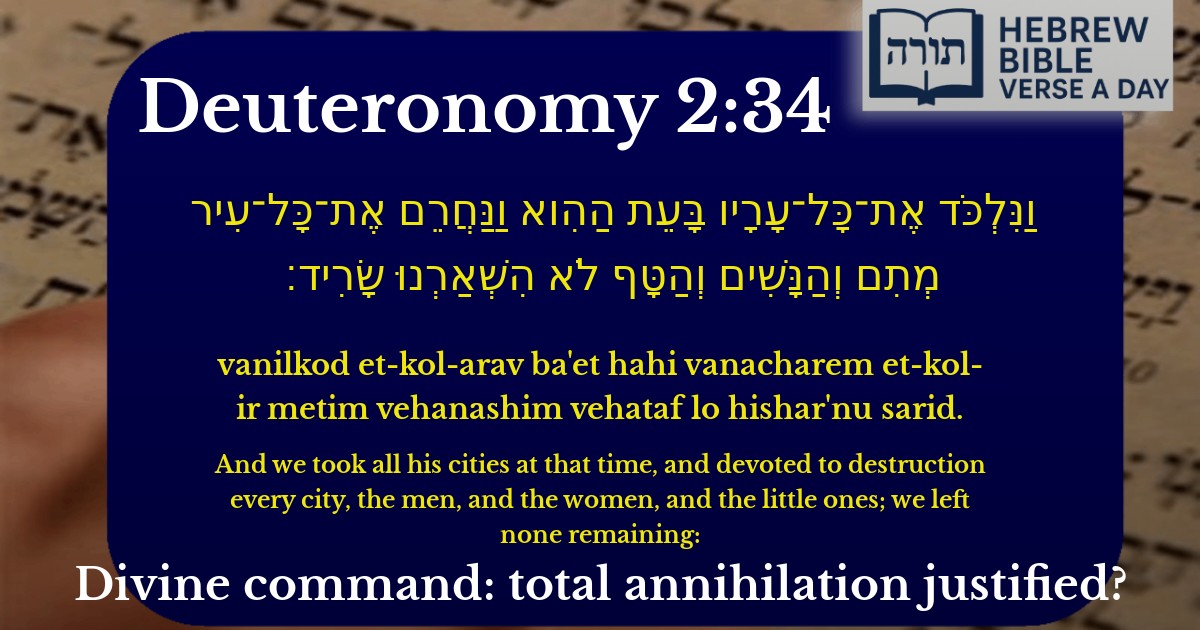Frequently Asked Questions
Q: What does Deuteronomy 2:34 mean when it says 'we devoted to destruction every city'?
A: This verse describes the commandment given to the Israelites to completely conquer certain enemy nations (like Sichon and Og) as part of entering the Land of Israel. The term 'devoted to destruction' (חֵרֶם) means these nations were to be utterly defeated as part of a Divine decree due to their extreme wickedness, as explained by Rashi and Ramban.
Q: Why did the Israelites have to destroy men, women, and children in this battle?
A: According to Jewish tradition (Talmud, Sanhedrin 96b), these nations (like Amalek and the Canaanite tribes) were so morally corrupt that their influence would have spiritually endangered Israel. The Torah commands this only in specific cases where G-d explicitly instructed it, not as a general rule of war. Rambam (Hilchot Melachim 6:4) explains this was a unique historical situation.
Q: How does Orthodox Judaism reconcile this violent verse with the Torah's emphasis on compassion?
A: Jewish teachings (Midrash Tanchuma, Shoftim 4) emphasize that these were exceptional circumstances commanded by G-d for specific reasons. The Talmud (Megillah 10b) notes that even angels questioned the destruction. However, we trust in Divine wisdom - these nations were irredeemably corrupt (Rashi on Deuteronomy 20:18). Such commands don't apply today.
Q: What lesson can we learn from Deuteronomy 2:34 today?
A: The verse teaches the importance of completely removing negative influences from our lives (Tanya, Chapter 31). Just as Israel had to eliminate corrupting influences to establish a holy society, we must decisively remove harmful habits or relationships that prevent spiritual growth, as explained in Mussar (Jewish ethical) works.
Q: Does this verse mean Judaism promotes violence?
A: Absolutely not. Traditional Jewish law (Rambam, Hilchot Melachim) strictly limits warfare and emphasizes peace whenever possible. These were unique historical commandments that don't apply after biblical times. The Talmud (Gittin 57b) teaches that G-d mourns the loss of any life, even enemies. Judaism's core values are peace and sanctity of life.


Context and Background
The verse (Devarim 2:34) describes the conquest of the cities of Sichon, king of Cheshbon, by Bnei Yisrael under Moshe's leadership. This event occurred during their journey toward Eretz Yisrael after being denied passage through Edom and Moav. The Torah emphasizes the complete destruction ("cherem") of the cities, including men, women, and children.
Rashi's Explanation
Rashi (Devarim 2:34) clarifies that this was a specific command from Hashem regarding the nations of Sichon and Og (as later mentioned in Devarim 3:6). He notes that this was not a general policy for all wars but a unique directive for these particular nations due to their extreme wickedness and the spiritual danger they posed to Bnei Yisrael.
Rambam's Perspective
In Hilchot Melachim (6:1-4), the Rambam explains the laws of "milchemet mitzvah" (obligatory war), which include the wars against the seven Canaanite nations and Amalek. He emphasizes that these commands were time-bound and geographically specific, not applicable to other nations or later generations unless under direct prophetic instruction.
Moral and Ethical Considerations
Halachic Implications
The Minchat Chinuch (Mitzvah 425) discusses how these commands were specific to that generation and cannot be applied without clear divine instruction. The Talmud (Sotah 35b) also notes that Yehoshua sent peace offers before engaging in battle, showing that destruction was not the first option.
Contemporary Lessons
Rabbi Samson Raphael Hirsch explains that this passage teaches the seriousness of spiritual contamination and the need to completely eradicate evil influences when they threaten the foundational values of Torah society. However, he stresses that such measures are only permissible when explicitly commanded by Hashem through proper channels.